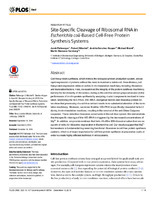Site-specific cleavage of ribosomal RNA in Escherichia coli-based cell-free protein synthesis systems

Fecha
2016Autor
Failmezger, Jurek
Nitschel, Robert
Kraml, Michael
Siemann-Herzberg, Martin
Sánchez-Kopper, Andrés
Metadatos
Mostrar el registro completo del ítemResumen
Cell-free protein synthesis, which mimics the biological protein production system, allows
rapid expression of proteins without the need to maintain a viable cell. Nevertheless, cellfree
protein expression relies on active in vivo translation machinery including ribosomes
and translation factors. Here, we examined the integrity of the protein synthesis machinery,
namely the functionality of ribosomes, during (i) the cell-free extract preparation and (ii) the
performance of in vitro protein synthesis by analyzing crucial components involved in translation.
Monitoring the 16S rRNA, 23S rRNA, elongation factors and ribosomal protein S1,
we show that processing of a cell-free extract results in no substantial alteration of the translation
machinery. Moreover, we reveal that the 16S rRNA is specifically cleaved at helix 44
during in vitro translation reactions, resulting in the removal of the anti-Shine-Dalgarno
sequence. These defective ribosomes accumulate in the cell-free system. We demonstrate
that the specific cleavage of the 16S rRNA is triggered by the decreased concentrations of
Mg2+. In addition, we provide evidence that helix 44 of the 30S ribosomal subunit serves as
a point-of-entry for ribosome degradation in Escherichia coli. Our results suggest that Mg2+
homeostasis is fundamental to preserving functional ribosomes in cell-free protein synthesis
systems, which is of major importance for cell-free protein synthesis at preparative scale, in
order to create highly efficient technical in vitro systems.
Descripción
Artículo científico
Fuente
PLoS ONECompartir
Métricas
Colecciones
- Artículos [12]

